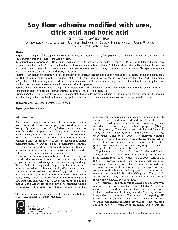摘要
Purpose - The purpose of this paper is to investigate an adhesive prepared from soy flour (SF) modified with urea, citric acid and boric acid as an environmentally friendly product for the wood industry.
Design/methodology/approach - Urea solution was prepared at 30 degrees C and then SF was added and stirred at 30 degrees C for 2 hours. Citric acid solution was added and stirred for another 0.5 hours and then boric acid solution was added and heated at 30 degrees C for a further 0.5 hours. The resulting adhesive was used to bond poplar veneers. Shear strength was measured to evaluate the bonding property of the adhesive. Viscometry and FT-IR spectrometry were used to test the viscosity and chemical changes, respectively.
Findings - Soy protein has potential value in the preparation of adhesives because of its unique functional characteristics. The optimum formulation was 100 g of soy powder treated with 9 g of citric acid at 30 degrees C for 0.5 hours in the presence of sodium dihydrogen phosphate (NaH(2)PO(4)). After addition of 6 g of boric acid the resulting adhesive exhibited a shear strength of 0.82 MPa when bonded samples were treated with water, indicating that boric acid improved the water resistance via the formation of a chelating polymer.
Research limitations/implications - Compared to synthetic resin such as urea formaldehyde, the SF adhesive exhibited lower water resistance. Further modification methods and optimum chemical reagents still need to be investigated.
Originality/value - A new formulation for an environmentally friendly adhesive prepared from SF is identified for the panel industry. The bonding potential of soy protein was developed without any synthetic resin, which will promote industrial utilisation of an agricultural by-product.
- 出版日期2010
- 单位东北林业大学
